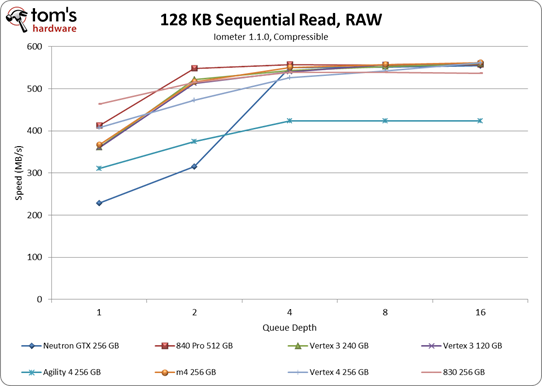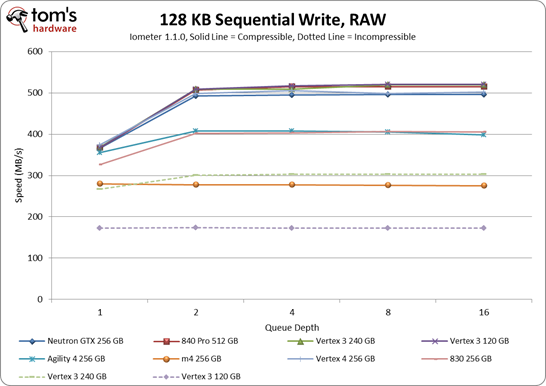Samsung 840 Pro SSD: More Speed, Less Power, And Toggle-Mode 2.0
Benchmark Results: 128 KB Sequential Performance
Sequential Read Performance
Examples include file copying, transcoding, game level loading, some gameplay, watching video, and editing video
Except for the Agility 4, all of the SSDs approach 550 MB/s in our sequential read test at a queue depth of four and higher.
Oddly, Samsung's 830 is the fastest performer at a queue depth of one, delivering ~470 MB/s. The 840 Pro isn't too far behind at 410 MB/s, effectively tying the Vertex 4. Meanwhile, the Vertex 3 and m4 appear in the middle of the pack, pushing ~370 MB/s.
OCZ's Agility 4 and Corsair's Neutron GTX start the test lagging, although the Corsair drive quickly ramps up above 500 MB/s at higher queue depths. Unfortunately, OCZ's new mainstream drive appears to get stuck at a maximum throughput just north of 400 MB/s.
Sequential Write Performance
Examples include Application Installation, Document Backup
Get Tom's Hardware's best news and in-depth reviews, straight to your inbox.
SandForce's second-gen controllers were the first to saturate the SATA 6Gb/s interface with sequential writes. Crucial's m4 debuted a month later, but could only offer about 60% as much performance. The caveat is that SandForce's drives rely on compression to achieve those numbers. Even in a worst-case scenario, though, the 240 GB Vertex 3 is slightly faster than the m4 when it comes to dealing with incompressible data.
Samsung's previous-generation 830 delivers up to 400 MB/s, which makes it strong competition for SandForce-based drives. However, that's only the case in environments with an even mix between compressible and incompressible data. Presented with completely compressible data, the Vertex 3 rises to the top.
Fortunately, the 840 Pro doesn't force us into all of those conditional statements. It's a notable improvement over the 830, matching what SandForce's technology relies on compressible data to do (except that Samsung can do it all of the time).
The Vertex 4 was the first drive we saw to achieve something along the same lines, and Corsair's Neutron GTX matches both competitors by shooting up to 500 MB/s or so at a queue depth of two. It's amazing what a year or evolution in this segment can do.
Current page: Benchmark Results: 128 KB Sequential Performance
Prev Page Benchmark Results: 4 KB Random Performance Next Page Benchmark Results: Storage Suite v1.0 And PCMark 7-
mayankleoboy1 Kudos to Samsung for getting ahead of the competition yet again. And the complete SSD is designed and manufactured in house! And thay are sure of its reliability, hence the 5 year warranty.Reply
I dont see why it did not get a Toms approved award.... its faster, uses less power, and offers better warranty than the competition. And the firmware is also stable, unlike SF. -
mayankleoboy1 Despite what the judges believe, Samsung is a great innovator. Unlike some fruity companies, that basically license other companies tech....Reply
-
willyroc Wow, Samsung was ahead of competitors with its 830 due to superior performance and low prices. Now I bet the 840 has, (or will) widened that lead.Reply -
pocketdrummer mayankleoboy1Kudos to Samsung for getting ahead of the competition yet again. And the complete SSD is designed and manufactured in house! And thay are sure of its reliability, hence the 5 year warranty. I dont see why it did not get a Toms approved award.... its faster, uses less power, and offers better warranty than the competition. And the firmware is also stable, unlike SF.Reply
Probably because it still costs $600 for a pathetic 512gb of memory. Once you can get 512gb for under $200 and have a life span that gets close to a decent HDD, then you can expect an award.
They keep increasing the speed, but they do nothing to reduce the COST. I would take an SSD half as fast as some that are out now if they cost me half as much and had a decent amount of storage. It's still pointless for someone like me who has over 1.5TB of space used. I can't load Windows and all of my critical programs on a 256GB SSD, and the 512GB wouldn't give me much wiggle room. Not to mention my sample libraries that would benefit from the speed... that are hundreds of GB each. -
So it's the Samsung 840Pro 256GB for C:, and it's the Seagate single-platter 1TB drive (ST1000DM003) for storage. Awesome awesome combo.Reply
-
sherlockwing Gah, 1 month after I get the 830 now comes the 840 Pro who gets another 120 mb/s in extra speed.Reply -
mayankleoboy1 sherlockwingGah, 1 month after I get the 830 now comes the 840 Pro who gets another 120 mb/s in extra speed.Reply
Thats technology growth for you :D -
sherlockwing To those that complain about SSD life span, the truth is that in 3 years(typical warranty of an SSD) you won't be using the same SSD because the new SSD will be 40-50% faster. 3 year from now I'd be using the 860 Pro with anyway and when an SSD reach end life it just can't write anymore, you can still read all the files onto your new SSD unlike a hard drive that just breaks down.Reply

